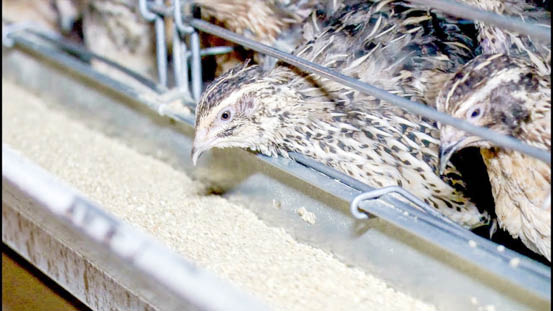Quails are smaller sized poultry birds, so it’s very easy to establish a quail farm. Quail farming is very profitable like other farming ventures such as chicken, turkey or duck farming. Almost all types of weather conditions are suitable for starting quail farming business. Meat and eggs of quail are very tasty and nutritious suitable for diabetic patient.
Quail eggs are very nutritious than other poultry eggs because quail eggs contain comparatively more protein, phosphorus, iron, vitamin A, B1 and B2. Quail farming business require small initial capital and labour. Quails can be raised along with your other poultry birds for meat or eggs production.
Characteristics of Quail
- Quails are very small sized bird.
- An adult quail weights between 150 to 200 grams and an egg weighs around 7 to 15 grams.
- Female quails start laying eggs within their 6 to 7 weeks of age and continuously lay one egg daily.
- They lay about 300 eggs in their first year of life. After that, they produce about 150 to 175 eggs in the second year. Eggs production gradually decrease after their first year of laying period.
- Quail egg is very suitable for human health. It contains 2.47 percent less fat than chicken egg. Many people believe that ‘quail eggs help to prevent blood pressure, and good for diabetic patients’.
- Quail meat is very tasty and nutritious. Fat is very low in their meat. So, quail the meat is very suitable for blood pressure patients.
- Quails do not incubate their eggs. So, you have to use an incubator or brooder chickens for hatching their eggs.
Egg price crash: We’re worst hit – Plateau farmers
What must be done to avert food crisis – Margarita Aswani
Life cycle of quails
Quail generally survives for three to four years. An adult quail weights between 150 to 200 grams. Female quails start laying eggs from six to seven weeks of age. Each egg weights between 7 and 15 grams. They lay more than 300 eggs per year. Their eggs are very beautiful. Presence of light increases the egg productive efficiency of quails. They usually lay eggs in the afternoon. It takes about 17 days for their eggs to hatch.
Housing
Caring for quail is relatively easy and simple as these birds are very small and they can be easily kept with other small birds. Quails are also very good as pets and they are great company. They are wonderful to watch and they also lay delicious eggs almost every day as well. Quails are small birds and they require less space as compared to other poultry birds. You can even raise some quails in your small back gardens that are not suitable for raising chickens.
Housing is very important for quail farming. Follow the instructions mentioned below while making house or cages for your quails.
- Quail can be raised in both litter and cage systems but quail farming in cage system is more suitable than raising them in deep litter system. In cage system, management is very easy and diseases or other problems are less.
- Make a proper ventilation system and ensure proper flow of air and light inside their house.
- You can raise 50 quails in a cage measuring 120 cm length, 60 cm wide and 25 cm height.
- Use wire net for making their cages.
- Measurement of the net would be 5 mm x 5 mm for adult quails.
- Plastic cages are most convenient for quail farming business.
- The house must have to be out of the reach of wild animals. Also prevent all types of predators.
Essential Equipment
Quails need some items to help keep them happy. Some essential items/equipment that they require are listed below.
Water Container:
Since quails are smaller sized birds, they require small water container. The container should not be too deep or big so that they can have easy access to it and not be in danger of drowning. Always try to keep enough clean water in the container.
Feeder:
Keep adequate number of feeders as per the number of total quails. The birds should be able to get to the feeder easily as well as the water container.
Small Plants:
Growing or potting a couple of plants in the housing will make your quails very happy, if your birds live on dirt or grass. Remember, quails are curious and love different types of plants in their habitat, just make sure the plants aren’t toxic to them.
Hiding Spots:
Your quails will love hiding spots. You can purchase a couple of large hamster huts and place them in the cage.
Sand Tub:
Dust bath is very important for quails, and they generally love dust bathing on a daily basis. Sand is also very effective for preventing annoying parasites such as mites. Keep the sand tub away from the water container, as they make a mess when they dust bathe.
Cleaning Cage
Clean the cages every one or two weeks. Cleaning the cage will help to prevent bacteria, mites and diseases. You should also dispose of all bedding hose the cage down, rinse the feeders and water container, replace the tub with fresh sand and refill the feeder and water container with fresh food and water.
Lighting Ensure proper lighting period for your birds. The quails can only have up to 15 hours of light per day, otherwise they will not be able to sleep. Quails need plenty of sleep to stay healthy, active and overall fun birds. Don’t leave any lights on or at least move the quail to a dark room so that they can sleep properly.
Keep the Environment Calm
Try to keep the environment calm. Keep noisy or dangerous pets out of the same room as the quail. Because noisy pet in the room can disturb the quail and cause stress.
Collect eggs daily
Ensuring fresh eggs, you should collect the eggs once every day, especially during the hot days. You can either put the eggs in the fridge or in an egg carton and leave them on the side. Keeping the eggs in fridge will keep them fresh for a longer period of time. On an average, you will get about 5-6 eggs per week from a female quail.
Inspect your quail’s health
Always try to inspect your bird’s health. Keep an eye on your bird’s health. If your birds seem to be acting a bit unusual or are not eating properly, then it’s probably because the quail is unwell. You can either call a vet or fix yourself. You can fix some small problems by yourself. Quails also can’t tolerate excessive hot temperature. You can move your birds to a cooler room, provide them with shade or take the heat source away.
Taming fully-grown quail is hard, but it can be easy if you handle your birds from a young age. Taming the young ones is not too hardy. You can grab them occasionally or play with them for a little while. You have to offer your birds food from your hands, visit them often and be very gentle to them. They are excellent flyers and they can fly very high when frightened. If a quail escapes, then it’s very hardy to catch it. You can clip the quail’s wings so that the bird can’t fly away from you.
Water
Along with providing your quails high quality and nutritious food, always ensure availability of adequate amount of clean and fresh water according to their demand.
Source: POULTRY PUNCH MAGAZINE

 Join Daily Trust WhatsApp Community For Quick Access To News and Happenings Around You.
Join Daily Trust WhatsApp Community For Quick Access To News and Happenings Around You.


